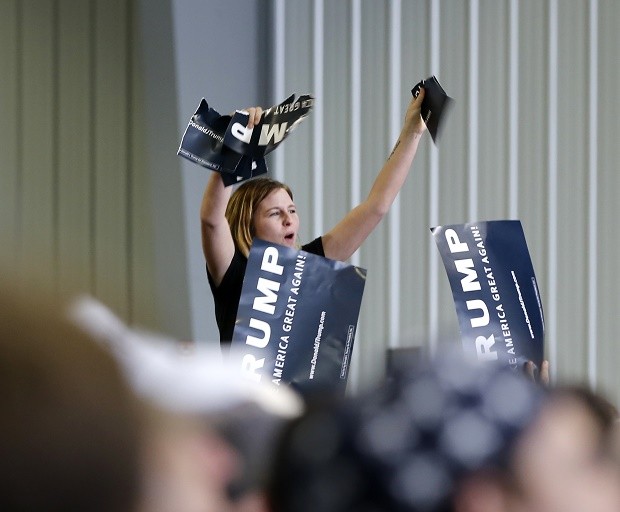2016 US race barrels toward potentially decisive primary day

A protester tears up a campaign sign for Republican presidential candidate Donald Trump during a rally Sunday, March 13, 2016, in Bloomington, Ill. AP
HANOVERTON, Ohio — The tumultuous presidential primary season barreled toward a potentially decisive day on Tuesday for both Republicans and Democrats that could transform Donald Trump and Hillary Clinton from front-runners to likely nominees.
The biggest prizes are Florida and Ohio, states with a long history of making or breaking White House aspirations. Missouri, Illinois, and North Carolina also offer a crucial cache of delegates to the parties’ national nominating conventions that could help Trump and Clinton pull further away from their rivals.
Trump holds a comfortable lead in the Republican delegate count and could put himself well on his way to securing the nomination if he sweeps Tuesday’s contests. He would cross an important threshold by collecting more than 50 percent of the delegates awarded so far.
Ohio Gov. John Kasich and Florida Sen. Marco Rubio hoped their home-state primaries —winner-take-all contests with 165 delegates at stake — would give them a boost, while a loss could end their candidacies. Polls show that Kasich seems to have a better chance at defeating Trump in Ohio than Rubio does in Florida.
That makes Ohio likely the key state in determining whether Trump puts himself on a path to winning the nomination by the end of the primary season on July 7 or the race continues on an uncertain path, possibly resulting in a contested convention.
Article continues after this advertisementREAD: Trump, Clinton continue dominance in 2016 primaries
Article continues after this advertisementAmong Democrats, Clinton has been itching to look ahead to the general election but continues to face persistent competition from Vermont Sen. Bernie Sanders. While Clinton maintains a commanding lead in the delegate count, Sanders breathed new life into his campaign with a surprising victory last week in Michigan. If Clinton comes out of Tuesday’s contests with decisive wins in several states and further pads her delegate lead, it would be difficult for Sanders to catch her because all the Democratic nominating contests allot delegates proportionally.
Tuesday’s contests come at a remarkable moment in the presidential race for Republicans. Animosity toward Trump has risen to the point where he can rarely get through an event without being interrupted by protesters. The front-runner is also under scrutiny for appearing to encourage his supporters to physically confront those protesters, deepening divisions within the Republican Party.
In a lightly veiled jab at Trump, Republican House Speaker Paul Ryan of Wisconsin said candidates “need to take responsibility for the environment at their events.”
“There is never an excuse for condoning violence, or even a culture that presupposes it,” Ryan told WRJN, a radio station in Racine, Wisconsin.
Even with the new controversy, Trump was already eying the general election when he appeared at campaign stop Monday in Tampa, Florida, where he was joined by former Alaska Gov. Sarah Palin.
“If we win Florida and we win Ohio, we can go and attack Hillary,” Trump said.
Heading into Tuesday, the billionaire businessman is locked in a tight contest in Ohio with Kasich. Seeking a final boost in his home state, Kasich spent Monday campaigning alongside Mitt Romney, the 2012 Republican nominee and a fierce critic of Trump.
“This is the guy Ohio has to vote for, and America’s counting on you,” Romney told the crowd at a Kasich event in North Canton. While Romney has not endorsed Kasich, he’s said he’ll do whatever is needed to help all of Trump’s rivals.
Florida Sen. Rubio also hopes to block Trump in a do-or-die primary in his home state, though polling suggests he’s slipping further behind. The senator tried to stay upbeat Monday, perhaps his final full day of campaigning in the 2016 race.
“Tomorrow’s the day where we are going to shock the country,” Rubio said during a stop in Jacksonville.
Trump’s closest competition has come from Texas Sen. Ted Cruz, who has defeated the businessman in seven states. He’s also the only remaining Republican candidate who still says unequivocally that he would support Trump if he becomes the nominee.
In the Democratic race, Sanders reprised a theme that helped propel his surprise Michigan win. On Monday, Sanders, a self-described democratic socialist, pounded Clinton’s past support for trade deals such as the North American Free Trade Agreement with Canada and Mexico. He’s escalated his criticism in recent days, hoping to undercut her edge among minorities and expand his advantage with white working-class voters.
“When it came down whether you stand with corporate America, the people who wrote these agreements, or whether you stand with the working people of this country, I proudly stood with the workers,” Sanders said in Youngstown, Ohio. “Secretary Clinton stood with the big money interests.”
READ: Clinton, Trump move closer to showdown with big primary wins
Clinton’s team is attempting to tamp down expectations for Tuesday night, stressing that the race remains close in the Midwest. Still, she’s eying the general election and escalating her attacks on Trump, saying he’s “inciting mob violence” at his rallies.
“I do hold him responsible,” she said in an interview with MSNBC. “He’s been building this incitement, he’s been leading crowds in jeering protesters”
The campaign next shifts to the West, where Sanders’ advisers have suggested he could rattle off a win streak and enter April with the chance to put a dent in Clinton’s delegate lead.